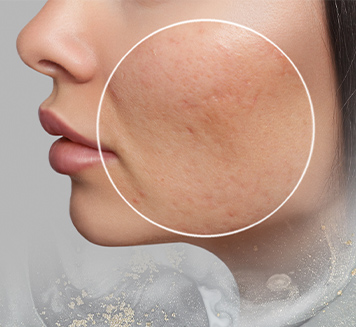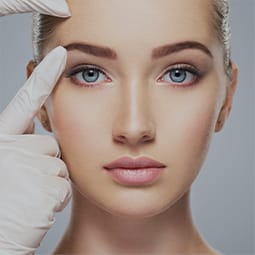Hormones? What Are They?
Hormones are your body’s chemical messengers that help control many different processes, like reproduction and metabolism. Hormones are produced in the endocrine glands and travel through the bloodstream to tell the body’s muscles, tissues, and organs what to do.
When hormones are out of balance, even just a little, it can severely affect the whole body. Although some hormones fluctuate naturally as we age, some fluctuations can result from the endocrine glands not producing the right amounts. You’ll often know when this happens as a broad range of symptoms accompany hormone imbalances.
What Happens When Your Hormones Are Out of Whack
Your body will tell you when your hormones are out of balance. You may experience any combination of symptoms depending on what’s being produced and what isn’t. These are some of the most common signs of hormone imbalances:

1. Weight Gain
If you haven’t changed your diet or exercise routine but seem to be gaining weight unintentionally, you might have a hormonal imbalance. Unintentional weight gain can be periodic, continuous, or rapid, depending on the cause. Weight gain most commonly associated with hormonal changes is periodic, which causes regular fluctuations in weight.
The most common hormone-related cause of weight gain is menopause in women. Between the ages of 45 and 55, women enter a stage in their lives where estrogen levels in their bodies decline. The drop in estrogen causes unintentional weight gain generally around the hips and abdomen.
Women with polycystic ovarian syndrome (PCOS) may also experience unintentional weight gain. PCOS is a condition that causes the body to produce higher-than-normal amounts of male hormones.
Additionally, menstruation can cause periodic weight gain due to fluctuating estrogen levels.
Other hormonal causes of unintentional weight gain in both men and women include:
Customized doctor-assisted weight loss plans can help you manage your weight, especially if it’s related to hormonal imbalances.
2. Fatigue
If you feel tired or lethargic all the time, you may have chronic fatigue. When you’re fatigued, you may have no motivation or energy to do anything. The condition can range in severity from mild to serious. If you eat a balanced diet and exercise regularly but find your fatigue symptoms don’t improve, a hormonal imbalance may be the culprit.
Fatigue is typically caused by something in 1 of 3 categories, lifestyle factors, physical health conditions, or mental health issues. Hormone imbalances fall into the physical health conditions category and may occur if you have any of the following conditions:
3. Irregular Menstrual Cycle
For individuals that menstruate, they can typically expect a period every 24 to 38 days that generally lasts between 2 and 8 days. Although everyone is different, your period will likely fit into these parameters if your hormones are in balance. If they are unpredictable, something may be off.
An irregular period is when the time between periods changes, you lose more or less blood every time, and the duration is varied. The body produces the hormones estrogen and progesterone to regulate menstruation, which is why young girls going through puberty and women entering perimenopause (or the time just before menopause) often experience irregular periods.
Other factors that affect your hormones and subsequently, the regularity of your period include:
- Having an intrauterine device (IUD)
- Changing birth control pills
- Certain medications
- Too much exercise
- Polycystic ovarian syndrome (PCOS)
- Pregnancy or breastfeeding
- Stress
- Hyperthyroidism
- Hypothyroidism
4. Sleep Problems
Sleep is regulated by our circadian rhythm, our 24-hour internal clock that controls our cognition, metabolism, sleep-wake cycle, and many other functions.
What’s considered a “master clock” in the brain called the hypothalamus is synchronized with the rest of the body through hormonal signals like the adrenocorticotropic hormone (ACTH) and cortisol. During the day, sunlight stops the pineal gland from producing melatonin, a hormone that helps you become sleepy before bed.
If any of these hormones aren’t being produced adequately, you might experience trouble with your sleep patterns.
5. Low Libido
The hormones that control your libido, or sex drive, differ depending on if you are a man or a woman. However, no matter what you identify as, if those hormones aren’t being produced normally, your libido will likely suffer.
Estrogen, progesterone, and testosterone all play a role in sexual desire.
Many different factors can play a part in why your hormones might cause you to have a low sex drive.
For women, these include:
- Pregnancy
- Breastfeeding
- Puberty
- Perimenopause or menopause
- Hormonal contraception
- Hormone therapy
- Polycystic ovarian syndrome (PCOS)
- Androgen excess
- Hirsutism
- Hypergonadism
- Ovarian tumor
For men, hormonal causes for low libido include:
6. Chronic Acne
Acne, sometimes referred to as hormonal acne, occurs due to uncontrolled hormones that change skin cell activity. A rise in androgens, like testosterone, can increase sebum production, inflammation, and colonization of hair follicles, which can lead to acne.
Acne presents itself as any combination of whiteheads, blackheads, pustules, cysts, and nodules. It can be painful and is often related to hormonal changes like most go through in puberty.
Hormonal changes related to pregnancy can also cause the development of acne. Rising testosterone levels and falling estrogen levels are generally the culprits for acne that develops or worsens suddenly.
Acne can be treated with a variety of at-home and professional treatments. If you have chronic acne, consult a physician experienced in treating acne for the best treatment for you.
7. Infertility
Infertility is described as the inability to conceive a child naturally after a year of trying or 6 months if you’re over 35 years old. The inability to carry a pregnancy to term may also be considered infertility.
Both men and women are equally likely to experience fertility problems, some of which are caused by hormonal imbalances. For men, this could mean low testosterone production, and for women, it may mean polycystic ovarian syndrome or a different hormonal imbalance.
If you’re having trouble getting pregnant, please talk to your doctor about your options.
8. Mental Health Problems
Your hormones control your mood more than you may be aware of. When your hormones aren’t in balance, you can experience irritability, anxiety, and nervousness.
Progesterone stimulates the part in the brain that controls your fight-or-flight response, which may lead to feelings of anxiety. Testosterone, adrenaline, cortisol, and oxytocin all play a role contributing to your overall mood and emotions.
Testosterone helps you assess social threats. Adrenaline and cortisol levels are associated with high levels of stress, and oxytocin helps intensify memories, both positive and negative.
If you’re feeling low or experiencing fluctuating moods, it’s always best to discuss it with a physician or therapist experienced in the field. Certain medications can balance your hormones and help you feel better.
9. Headaches
The female hormone estrogen has been linked to headaches, especially migraine headaches. Estrogen is responsible for controlling chemicals in the brain that affect the sensation of pain, so if levels drop, it can trigger a headache.
Hormone levels can change during the menstrual cycle, pregnancy, and menopause, which many may directly associate with their migraine headaches. Using hormonal contraceptives or undergoing hormone replacement therapies can also trigger estrogen level fluctuations, which may cause headaches.
If pain levels become unbearable, it may be a sign of a more serious underlying cause. Please talk to your doctor.
10. Constipation
Estrogen and progesterone affect many different parts of the body, including the digestive tract. Women experience a dip in estrogen and progesterone levels during perimenopause and menopause, causing changes in bowel movements.
Estrogen helps keep the stress hormone cortisol levels down. When estrogen levels decline, cortisol levels rise, which can slow down the digestive process. When the digestive process slows, the stool can harden and become more difficult to pass.
Low progesterone levels can cause your colon to slow down, which causes food waste to remain in your colon for longer. The longer it stays in your colon, the dryer it gets. Dry stool is also harder to pass, contributing to constipation.
11. Excessive Sweating
If you’ve ever been incredibly nervous, you may have experienced nervous sweats. Alongside nerves, anxiety, stress, and other emotions can cause the body to sweat even if it isn’t overheating. When something excites or scares you, the body releases stress hormones adrenaline and cortisol, which alert the apocrine glands. The apocrine glands are the sweat glands located in your armpits and groin, making you feel overly sweaty during a stressful interaction.
Menopause is also a common cause of excessive sweating. Fluctuating levels of estrogen and progesterone affect the body’s temperature control. Without regulation, the body will experience “hot flashes” or sudden periods of warmth, flushing, and sweating.
12. Hair Loss
Dihydrotestosterone (DHT) is the hormone behind hair loss in both men and women. DHT is made from testosterone by an enzyme called 5-alpha reductase. It can also be made from DHEA, which is a hormone more common in women.
With hair loss, the hair follicles shrink, causing new hair growth to become finer and finer until there’s no hair left at all. DHT contributes to hair follicle shrinkage and causes hair to take longer to grow once old hair falls out.
So What Can You Do?
If you’re experiencing symptoms of a hormone imbalance, it’s always in your best interest to consult a medical professional. At Zulu Medical Cosmetics, we offer many treatments that can address hormonal imbalances and the symptoms it may cause.
Our Longevity Program offers optimization of 5 crucial areas to balance your hormones:
- Nutrition optimization
- Effective, regular physical activity and exercise prescription
- Bio-identical hormone optimization
- Strategic supplements
- Mindfulness



















